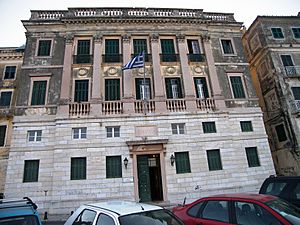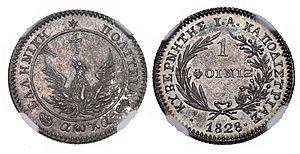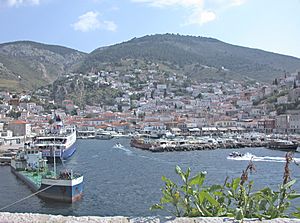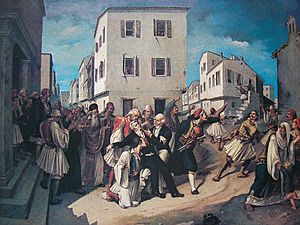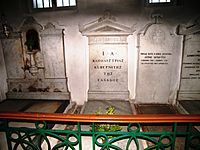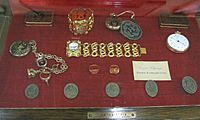Ioannis Kapodistrias facts for kids
Quick facts for kids
Ioannis Kapodistrias
|
|
|---|---|
| Ιωάννης Καποδίστριας | |
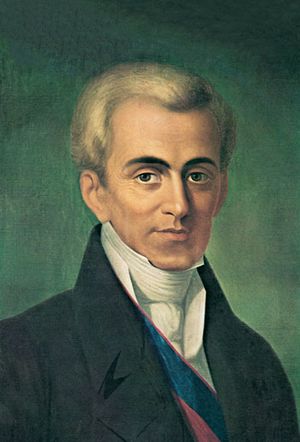
Portrait by Dionysios Tsokos
|
|
1st Governor of Greece |
|
| In office 18 January 1828 – 27 September 1831 |
|
| Preceded by | Andreas Zaimis as President of the Governmental Commission |
| Succeeded by | Augustinos Kapodistrias |
| Foreign Minister of Russia | |
| In office 1816–1822 Serving with Karl Nesselrode
|
|
| Monarch | Alexander I |
| Preceded by | Nikolay Rumyantsev |
| Succeeded by | Karl Nesselrode |
| Personal details | |
| Born | 11 February 1776 Corfu, Venetian Ionian Islands |
| Died | 27 September 1831 (aged 55) Nafplion, First Hellenic Republic |
| Nationality | Greek |
| Political party | Russian Party |
| Relations | Viaros Kapodistrias (brother) Augustinos Kapodistrias (brother) |
| Alma mater | University of Padua |
| Signature | |
Count Ioannis Antonios Kapodistrias (Greek: Κόμης Ιωάννης Αντώνιος Καποδίστριας; c. 10 February 1776 – 9 October 1831) was a very important Greek statesman. He was one of the most famous politicians and diplomats in Europe during the 1800s.
Kapodistrias started his political journey as a minister in the Septinsular Republic. Later, he became the Foreign Minister of the Russian Empire from 1816 to 1822. He then actively supported the Greek War of Independence. In 1827, he was chosen as the first head of state for independent Greece. He served as Governor of Greece from 1828 to 1831. Many people see him as the founder of the modern Greek state and the person who helped Greece gain its freedom.
Ioannis Kapodistrias: Greece's First Leader
Early Life and Education
Ioannis Kapodistrias was born in Corfu. This was the largest of the Ionian Islands. At that time, it was ruled by Venice. His family was well-known and noble in Corfu. His father, Antonios Maria Kapodistrias, was a nobleman, artist, and politician.
The Kapodistrias family had a special title, "conte" (count). This title came from the city of Capodistria in Slovenia. His family moved to Corfu in the 1200s. They changed their religion and became fully Greek.
His mother, Adamantine Gonemis, was also a countess. Her family, the Gonemis, were originally from Cyprus. They moved to Corfu after Cyprus and Crete were taken by the Ottomans.
Even though he was born into a noble family, Kapodistrias believed in liberal and democratic ideas. His ancestors had fought alongside the Venetians to protect Corfu.
Kapodistrias studied medicine, philosophy, and law at the University of Padua from 1795 to 1797. When he was 21, in 1797, he started working as a doctor in Corfu. In 1799, when Russian and Turkish forces briefly took Corfu, Kapodistrias became the chief doctor for the military hospital. In 1802, he started an important group in Corfu called the "National Medical Association."
Serving the Septinsular Republic
After a period of French rule, Russia and the Ottoman Empire took control of the seven Ionian islands in 1799. They created a new, independent state called the Septinsular Republic. It was ruled by its nobles.
Kapodistrias, who was only 25, became one of the two ministers of this new state. He helped keep the people united and peaceful. He also set up the government in all seven islands.
When a new Ionian Senate was elected, Kapodistrias was chosen as the Chief Minister of State. In 1803, the Senate approved a more democratic constitution. As minister, he organized public services, especially focusing on education. In 1807, the French took over the islands again and ended the Septinsular Republic.
Diplomat for Russia
In 1809, Kapodistrias began working for Alexander I of Russia. His first big job was in 1813. He became an unofficial Russian ambassador to Switzerland. His goal was to help Switzerland become free from Napoleon's control.
He helped Switzerland become united, independent, and neutral. The major European powers officially agreed to protect Switzerland's neutrality. He also helped create a new constitution for the 19 cantons (states) of Switzerland.
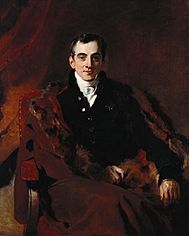
In 1814, he helped create the "Philomuse Society" in Vienna. This group promoted education and supported Greeks studying in Europe.
At the Congress of Vienna in 1815, Kapodistrias was the Russian minister. He worked against the strong influence of the Austrian minister, Prince Metternich. Kapodistrias insisted that France should remain a single state under a Bourbon king. He also got international agreements to protect Switzerland's constitution and neutrality. After these successes, Alexander I made Kapodistrias a joint Foreign Minister of Russia.
Supporting Greek Independence
Kapodistrias was always very interested in his home country, Greece. He especially cared about the Ionian Islands, which were then under British rule. He tried to get the Russian Emperor to pay attention to Greek issues.
In 1821, Kapodistrias learned that Prince Alexander Ypsilantis had invaded Moldavia. Ypsilantis wanted to start a big uprising against the Ottoman Empire. Czar Alexander did not want to support a revolt against the Ottomans. So, Kapodistrias had to write a statement in Alexander's name. It criticized Ypsilantis and said Russia would not help him. This was hard for Kapodistrias as a Greek.
Later, the Ottomans publicly hanged the Patriarch Grigorios V in Constantinople. This, and news of other killings of Orthodox priests, made Czar Alexander angry. He had Kapodistrias write an ultimatum to the Ottomans. It accused them of mistreating Orthodox subjects and breaking treaties. When the Ottomans did not reply, Russia ended diplomatic relations.
Kapodistrias became more and more active in supporting Greek independence. However, he could not get Alexander's full support for the Greek revolution of 1821. This made Kapodistrias's position difficult. In 1822, he took a long break from his job as Foreign Minister. He moved to Geneva, where he worked to support the Greek revolution. He helped organize money and moral support.
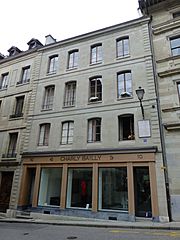
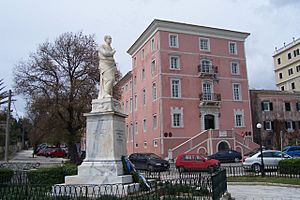
Leading Independent Greece
In 1827, the Greek National Assembly elected Kapodistrias as the first head of state of newly free Greece. He was given the title of Kyvernetes (Governor) for seven years. People in Geneva respected him greatly. He was even made an Honorary Citizen for his help to Switzerland.
Kapodistrias was a very hard worker. He worked from early morning until late at night. He was a quiet person, and few people knew him well.
He arrived in Nafplion on January 7, 1828, and in Aegina on January 8, 1828. It was his first time on the Greek mainland. He found Greece in a difficult state. Even with the fight against the Ottomans still going on, there had been two civil wars. The country was broke, and Greeks could not form a united government. Everywhere Kapodistrias went, people welcomed him with great excitement.
Kapodistrias asked the Senate to give him full power. He wanted to suspend the constitution and replace the Senate with a Panhellenion. Its 27 members would all be chosen by him. All his requests were granted. He promised to call a National Assembly in April 1828, but it took 18 months for it to meet.
He announced the creation of the Hellenic State. From Nafplion, the first capital of Greece, he started a new era for the country. It had just been freed from hundreds of years of Ottoman rule.
Building a New Nation
Kapodistrias's most important job was to create a modern state and a civil society. He worked very hard on this. He launched a big reform program that covered many areas. Kapodistrias believed that Greece needed a strong leader to lift the nation out of poverty. He thought that once Greeks were educated and owned property, democracy could be established.
He often spoke strongly about other Greek leaders. He believed many were only interested in power for themselves. He thought only peasants and artisans were worthy of his love and protection. He openly said his government was for their benefit.
Kapodistrias brought military unity back to Greece. He ended the divisions among Greek forces. He also reorganized the military, creating a regular Army. This helped Greece win back much land from the Ottoman army. The Battle of Petra in September 1829 ended the war's military operations. It secured Greek control in Central Greece.
He introduced the Byzantine Hexabiblos as a temporary civil law. He founded the Panellinion, an advisory group, and a Senate. He also created the first Hellenic Military Academy, hospitals, orphanages, and schools. He brought in new farming methods. He was interested in setting up the first national museums and libraries. In 1830, he gave legal equality to Jews in the new state. This was one of the first European states to do so.
He was interested in planning cities that had been destroyed in the war. He asked Stamatis Voulgaris to create new plans for Patras and Argos. He also planned the Prónoia quarter in Nafplio for war refugees.
He started the first modern quarantine system in Greece. This helped control diseases like typhoid fever, cholera, and dysentery. He negotiated with other countries and the Ottoman Empire about Greece's borders. He signed the peace treaty that ended the War of Independence. He introduced the phoenix, the first modern Greek money. He organized local government. To improve people's lives, he introduced the potato to Greece.
According to a story, Kapodistrias ordered potatoes to be given out. But people were hesitant to take them. So, he had a whole shipment of potatoes put on display in Nafplion. He placed guards around them to make people think they were valuable. Soon, people started to steal them. The guards were told to let them. This way, all the potatoes were "stolen," and Kapodistrias succeeded in introducing them to Greece.
He also tried to reduce the power of traditional clans or families. He thought they were outdated. However, he did not realize how strong the capetanei (commanders) were. These were the leaders of the revolt against the Ottomans. They expected to have a big role in the new government. When a fight broke out between the capetanei of Laconia and the appointed governor, he called in Russian troops.
Challenges and Opposition
By 1831, some groups disliked Kapodistrias's government. These included the independent Maniates, some Roumeliotes, and rich merchant families from Hydra, Spetses, and Psara. These groups often supported British policies.
The people of Hydra refused to give their customs money to Kapodistrias. This was their main source of income. It seemed that Kapodistrias was ruling like a dictator. The city of Hydra told Admiral Miaoulis and Mavrocordatos to go to Poros. They were to seize the Greek Navy's fleet there. Miaoulis did this to prevent a blockade of the islands.
Kapodistrias asked British and French forces for help to stop the rebellion. But they refused. Only the Russian Admiral Pyotr Ivanovich Ricord took his ships to Poros. Colonel Kallergis brought Greek Army soldiers and irregular forces to help. Miaoulis had less than 200 men and could not fight much. Fort Heideck on Bourtzi Island was taken by the soldiers. The ship Spetses was sunk by Ricord's forces.
Miaoulis was forced to blow up the flagship Hellas and the ship Hydra. He and his followers returned to Hydra. Kallergis's men were angry about the lost ships and looted Poros.
Losing the best ships hurt the Greek Navy for many years. It also weakened Kapodistrias's position. He did finally call the National Assembly. But his other actions caused more opposition, which led to his downfall.
His Assassination
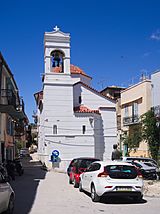
In 1831, Kapodistrias ordered the arrest of Petrobey Mavromichalis. Petrobey was the leader of the Mani Peninsula, a wild and rebellious part of Greece. Mani had stayed independent from the Ottoman Empire and had led the revolution.
Arresting their leader was a great insult to the Mavromichalis family. On September 27, Petrobey's brother Konstantis and son Georgios Mavromichalis decided to kill Kapodistrias. They waited for him when he went to church that morning at the Church of Saint Spyridon in Nafplion.
Kapodistrias decided to go to church early, even though his servants told him to stay home. When he reached the church, he saw his assassins. As he reached the steps, Konstantis and Georgios came close. Konstantis fired his pistol but missed. The bullet is still visible in the church wall. Georgios stabbed Kapodistrias in the chest. Konstantis then shot him in the head.
Konstantis was shot by General Fotomaras, who saw the murder from his window. Georgios escaped and hid in the French Embassy. After a few days, he gave himself up to Greek authorities. He was sentenced to death by a military court and executed by firing squad. His last wish was not to be shot in the face. His last words were "Peace Brothers!"
Ioannis Kapodistrias was replaced by his younger brother, Augustinos Kapodistrias. Augustinos ruled for only six months, and the country fell into chaos. Later, King Otto was given the throne of the newly formed Kingdom of Greece.
Lasting Legacy and Honors
Honored in Greece
Kapodistrias is highly respected in Greece today. In 1944, Nikos Kazantzakis wrote a play called "Capodistria" in his honor. The University of Athens is named "Kapodistrian" after him. His face is on the Greek 20 lepta euro coin. It was also on the 500 drachmas banknote before the euro. A program that reduced the number of municipalities in the 1990s also carries his name.
After Kapodistrias's death, Britain, France, and Russia wanted Greece to be a monarchy. They were worried about liberal and republican movements after the French Revolution. His summer home in Koukouritsa, Corfu, is now a museum. It is called the Kapodistrias Museum and shows his life and achievements.
Recognition Abroad
On December 8, 2001, a statue of Ioannis Kapodistrias was unveiled in Koper (Slovenia). The square was renamed after him. Koper was the home of Kapodistrias's ancestors before they moved to Corfu. The statue was made by Greek sculptor K. Palaiologos.
On September 21, 2009, the city of Lausanne in Switzerland put up a bronze statue of Kapodistrias. A street in Ouchy, Lausanne, is also named allée Ioannis-Capodistrias after him. The cantons of Geneva and Vaud in Switzerland made Kapodistrias an honorary citizen. The quai Capo d’Istria in Geneva is named after him.
On June 19, 2015, the Prime Minister of Greece, Alexis Tsipras, spoke to Greeks living in Russia at a statue of Ioannis Kapodistrias in St. Petersburg.
International Connections
On February 24, 2007, several cities created the Ioannis Kapodistrias Network. These cities are Aegina, Nafplion, Corfu, Koper-Capodistria, and Famagusta. The network aims to share information about Kapodistrias's life and ideas. The Greek city of Nafplion currently leads this network.
See also
 In Spanish: Ioannis Kapodistrias para niños
In Spanish: Ioannis Kapodistrias para niños
 | William L. Dawson |
 | W. E. B. Du Bois |
 | Harry Belafonte |


